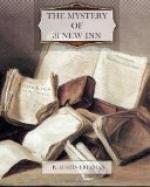One of the conditions of medical practice is the capability of transferring one’s attention at a moment’s notice from one set of circumstances to another equally important but entirely unrelated. At each visit on his round, the practitioner finds himself concerned with a particular, self-contained group of phenomena which he must consider at the moment with the utmost concentration, but which he must instantly dismiss from his mind as he moves on to the next case. It is a difficult habit to acquire; for an important, distressing or obscure case is apt to take possession of the consciousness and hinder the exercise of attention that succeeding cases demand; but experience shows the faculty to be indispensable, and the practitioner learns in time to forget everything but the patient with whose condition he is occupied at the moment.
My first morning’s work on the Blackmore case showed me that the same faculty is demanded in legal practice; and it also showed me that I had yet to acquire it. For, as I looked over the depositions and the copy of the will, memories of the mysterious house in Kennington Lane continually intruded into my reflections, and the figure of Mrs. Schallibaum, white-faced, terrified, expectant, haunted me continually.
In truth, my interest in the Blackmore case was little more than academic, whereas in the Kennington case I was one of the parties and was personally concerned. To me, John Blackmore was but a name, Jeffrey but a shadowy figure to which I could assign no definite personality, and Stephen himself but a casual stranger. Mr. Graves, on the other hand, was a real person. I had seen him amidst the tragic circumstances that had probably heralded his death, and had brought away with me, not only a lively recollection of him, but a feeling of profound pity and concern as to his fate. The villain Weiss, too, and the terrible woman who aided, abetted and, perhaps, even directed him, lived in my memory as vivid and dreadful realities. Although I had uttered no hint to Thorndyke, I lamented inwardly that I had not been given some work—if there was any to do—connected with this case, in which I was so deeply interested, rather than with the dry, purely legal and utterly bewildering case of Jeffrey Blackmore’s will.
Nevertheless, I stuck loyally to my task. I read through the depositions and the will—without getting a single glimmer of fresh light on the case—and I made a careful digest of all the facts. I compared my digest with Thorndyke’s notes—of which I also made a copy—and found that, brief as they were, they contained several matters that I had overlooked. I also drew up a brief account of our visit to New Inn, with a list of the objects that we had observed or collected. And then I addressed myself to the second part of my task, the statement of my conclusions from the facts set forth.
It was only when I came to make the attempt that I realized how completely I was at sea. In spite of Thorndyke’s recommendation to study Marchmont’s statement as it was summarized in those notes which I had copied, and of his hint that I should find in that statement something highly significant, I was borne irresistibly to one conclusion, and one only—and the wrong one at that, as I suspected: that Jeffrey Blackmore’s will was a perfectly regular, sound and valid document.




